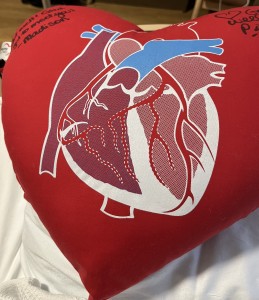(Note, I am trying to make a joke here. In Chinese, 开心 literally means Open Heart. In most cases it means happiness or to open your full heart for joy and happiness! In this series Open Heart Happiness refer to my open-heart surgery process.)
No updates after my first chapter? It’s not because I didn’t make it, but…
The Open heart surgery went very well, four by-passes, known as “bridging” in Chinese. They also fixed a faulty heart valve on the way.
Normally, this type of surgery takes four to six hours, but mine took nine hours. I guess my life has always been a bit exceptional.
For bridging, they usually take two segments of blood vessels from the patient’s legs and arms to replace the original heart blood vessels. Because I’m too thin, it was difficult to harvest the blood vessels. They used the term “harvest,” which means to collect or reap in Chinese.
I woke up in the intensive care unit, the biggest issue being that I couldn’t speak. I was trying to talk, but no sound came out. I could only communicate with the doctors and nurses by writing. They said that prolonged intubation during surgery can affect the swallowing function and the vocal cords and esophagus.
The doctors did a 3D X-ray, or dynamic X-ray, to assess my swallowing function. They advised me to only eat “soft food” and drink “thickened” water, which means adding a powder to water to make it thicker to prevent it from entering the airway while drinking.
No doctor lifted this restriction, and this special treatment continued until I was able to make decisions for myself at home.
Another issue was constant coughing. They gave me a “cough pillow” to press against my chest to reduce the vibration of the ribs and heart during coughing.
Along with the cough pillow, they also provided a colored pen for visitors to sign and write wishes.
I stayed in the ICU for a few days, then transferred to a regular ward for a while. They probably thought I wasn’t in much danger anymore, so they transferred me to a rehabilitation center.
This so-called rehabilitation center is like a nursing home, with a part dedicated to rehabilitation. My daughter checked it out, and this place didn’t have a great reputation, with low ratings. But the hospital’s social worker couldn’t find any other options, so this was it.
I’m not too picky, and the nurses are dedicated. Every day, they had me walk with a walker in the hallway and practice going up and down stairs. The goal of rehabilitation is to regain enough strength and skills to live independently.
The only thing I didn’t like was that they checked what belongings new patients brought with them and recorded everything. Such lack of trust! Do they think I’d steal something when I leave? Isn’t American society based on the honor system?
Another annoyance was the noise in the hallway during the nurses’ shift changes.
Once rehabilitation was over, they sent me home. But there’s still home care to deal with.
A visiting nurse comes once a week, measuring my blood pressure, temperature, oxygen levels, and other vital signs. Then she helps me organize my medications. The pills are divided into a seven-day pillbox, with morning and afternoon doses.
She says her ultimate goal is to teach me to organize my own pills every week.
What’s so difficult about that? Even though I don’t know what each pill is for, can’t I just follow the instructions on the bottles, days of the week, and morning or afternoon?
The home visits also include occupational therapy (OT) and swallowing therapy.
Occupational therapy aims to regain the skills needed for my profession. My only issue is that my right hand is weaker than my left, and I type with different force on the keyboard. They say that the long surgery time, nine hours maintaining the same position, might have compressed a nerve. Nerve recovery will take a long time.
In the second week, she brought some “squeezy putty” for hand exercises and a resistance band, and then she stopped coming.
The most annoying part was the swallowing therapy. Even though my swallowing was already normal, because the doctor didn’t lift the restriction on eating soft food and thickened water, she still came every week to teach me various swallowing exercises.
Afterward, all the home visits stopped. Because in the second week, I had to go to the hospital as an outpatient for cardiac rehabilitation. Once I could go to outpatient appointments by myself, the insurance company stopped covering home care.
Oh, by the way, there’s no such thing as having family members to help caring for patients in American hospitals. Nursing is done by nurses and aides. Family members would just cause trouble. In Chinese hospitals, having family members stay overnight for caring is obviously not standardized!


